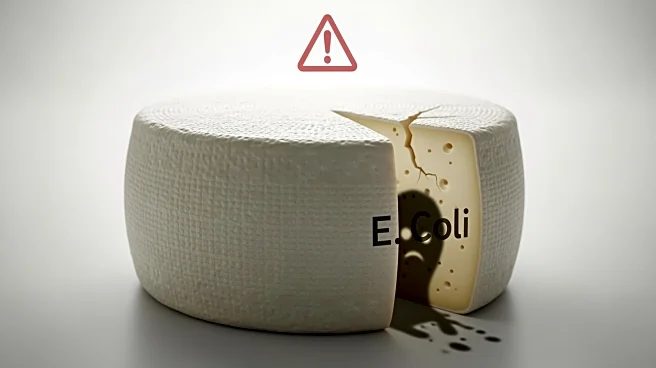What's Happening?
Two residents in Whatcom County, Washington, and one in Oregon have been sickened by cheese contaminated with E. coli O103, with a genetic link to products from Twin Sisters Creamery. This incident highlights
the ongoing public health challenge posed by non-O157 Shiga toxin-producing E. coli (STEC) strains. Historically, the classification of E. coli strains as adulterants has been a significant development in U.S. food safety policy. The U.S. Department of Agriculture's Food Safety and Inspection Service (FSIS) declared E. coli O157:H7 an adulterant in 1994 following a deadly outbreak linked to undercooked hamburgers. This led to a zero-tolerance policy for this strain in raw ground beef. Over time, advocacy by food safety law firms, such as Marler Clark, has expanded this classification to include six additional STEC strains, including O103, in raw ground beef.
Why It's Important?
The classification of E. coli O103 as an adulterant is crucial for public health and the food industry. It provides a legal basis for holding companies accountable for foodborne illnesses caused by these pathogens. This regulatory change has driven the meat industry to innovate in testing and sanitation practices, reducing the incidence of illnesses from both O157:H7 and non-O157 STECs. The recent cases linked to cheese underscore the need for continued vigilance and regulatory enforcement to protect consumers. The broader impact includes improved food safety standards and heightened awareness of the risks posed by various E. coli strains, ultimately aiming to prevent outbreaks and safeguard public health.
What's Next?
The FSIS's zero-tolerance policy for non-O157 STECs in raw beef trim, implemented in 2012, will likely continue to influence industry practices and regulatory oversight. The recent outbreak may prompt further scrutiny of cheese and other dairy products, potentially leading to expanded testing and stricter safety protocols. Stakeholders, including food safety advocates and regulatory agencies, may push for additional measures to prevent contamination and protect consumers. The ongoing dialogue between industry leaders and public health officials will be critical in shaping future food safety policies and ensuring compliance with existing regulations.
Beyond the Headlines
The broader implications of classifying E. coli strains as adulterants extend to ethical and legal dimensions. It reflects a commitment to consumer safety and the ethical responsibility of food producers to prevent harm. The legal framework established by these classifications empowers consumers and advocates to seek justice and accountability in cases of foodborne illness. Culturally, it reinforces the importance of food safety in public consciousness and encourages a proactive approach to preventing outbreaks. Long-term, these developments may lead to a more resilient and transparent food supply chain, with enhanced trust between consumers and producers.









